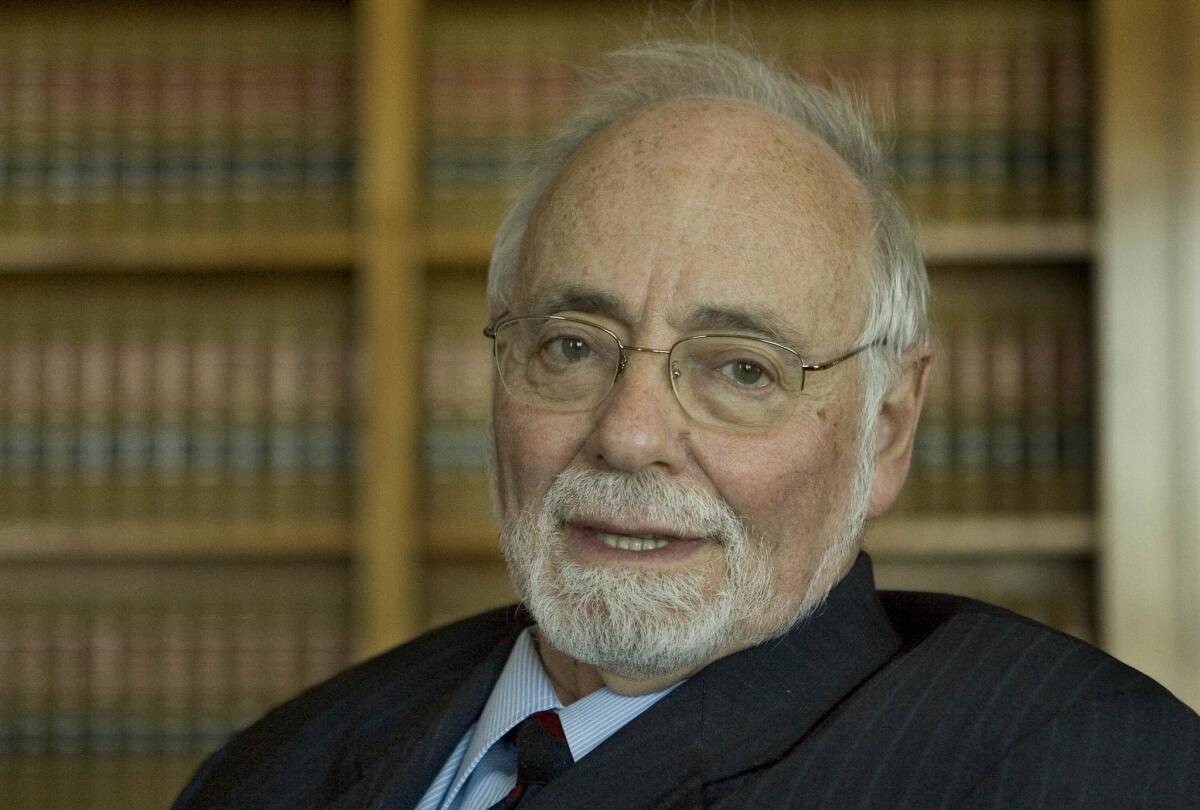Lawrence Karlton dies at 80; federal judge who pushed for prison reforms

As a federal judge, Lawrence Karlton pushed for prison reforms in Califorina
- Share via
Lawrence K. Karlton, a U.S. district judge who played a key role in prodding the state of California to reduce its prison population and improve conditions for mentally ill inmates, died Saturday in Sacramento. He was 80.
His death was confirmed by a spokesman for the U.S. District Court’s Eastern District, where Karlton had served for 35 years until stepping down last October. The cause was not given, but a colleague said Karlton had heart problems.
The veteran jurist, who was appointed to the federal bench by President Carter, had often kindled controversy with his rulings.
In 1998, he tossed out a voter-approved ballot initiative limiting campaign contributions, saying the donation ceiling was unreasonably low.
In 2005 he ruled that requiring public school chiildren to recite the words “under God” in the Pledge of Allegiance was unconstitutional.
And in 2009, he was part of a three-judge panel that ordered California to shrink its prison population by 43,000 inmates to meet constitutional standards.
The panel’s 185-page opinion was the culmination of nearly 14 years of deliberations over lawsuits by inmates alleging that prison crowding was cruel and unusual punishment.
In one of his last major rulings, Karlton last year ordered state officials to revise policies involving the use of pepper spray or other force on mentally ill prisoners after a series of videos were made public showing prison guards dousing psychotic inmates with the burning chemical.
Karlton “was one of the leading judges in the nation in forcing California to provide basic services to severely mentally ill prisoners,” Donald Specter, director of the nonprofit Prison Law Office in Berkeley, which brought suit on crowding issues, said Monday.
“He didn’t always rule in our favor, but his rulings were always incredibly thoughtful and tried to strike an appropriate balance between the rights of prisoners and the needs of the state of California,” Specter said.
Karlton joined U.S. District Judge Thelton Henderson of San Francisco and U.S. 9th Circuit Court of Appeals Judge Stephen Reinhardt of Los Angeles on the federal panel, which was formed in 2007 to consider capping California’s inmate population to improve prison medical and mental health care.
The number of inmates in the state prison system dipped below the court-imposed limit for the first time this year.
“State officials get a lot of the credit,” said U.S. Magistrate Judge Dale A. Drozd, who clerked for Karlton in the early 1980s. “But tremendous progress has been made in that area in part because of the efforts of the federal judiciary that includes Judge Karlton. That will serve as part of his legacy.”
Karlton was born in New York City on May 28, 1935. After earning his law degree from Columbia University in 1958, he served in the Army and then worked for a short time as a civil legal officer at the Sacramento Army Depot. In 1962, he entered private practice in Sacramento.
In 1976 he was appointed to the Superior Court in Sacramento by Gov. Jerry Brown, then in his first term. Confirmed to the federal bench in 1979, he served as chief judge for the Eastern District from 1983 to 1990.
His efforts to improve conditions for mentally ill prisoners began in 1990 when he appointed a special master to oversee their treatment in the state’s 34 adult prisons. The battle has been contentious, with some legislators, law enforcement officials and other critics alleging that the prison population cap ordered by Karlton and his fellow jurists would endanger public safety. The cap was upheld by the U.S. Supreme Court in 2013.
“The folks who ran the prisons didn’t feel a responsibility to provide constitutional health care for the inmates,” Karlton once told the Sacramento Bee. “If the litigation has done nothing else, I think it has disabused them of that notion.”
Karlton is survived by his wife, Sue, and daughter Emily Williams.
Twitter: @ewooLATimes
More to Read
Start your day right
Sign up for Essential California for the L.A. Times biggest news, features and recommendations in your inbox six days a week.
You may occasionally receive promotional content from the Los Angeles Times.








